Is JPay Safe to Use?
JPay is a private company that partners with correctional facilities to provide digital communication systems enabling incarcerated individuals and their loved ones to stay in touch. The facility offers a variety of services that allows loved ones to send money to those in correctional facilities, as well as exchange correspondence. This article closely reviews JPay's services and looks at whether . Sign up with us to learn more.
What Is JPay?
Going by the description on their website, JPay is a private company that works with correctional facilities at the federal, state, and county levels to provide safe, reliable, and convenient services to families and friends with loved ones in correctional facilities. They also offer payment solutions for offenders, parolees, and probationers, and a support page to address inquiries.
How Does JPay Work?
JPay has a variety of products under its portfolio. They include:
| Sending Money | This service allows loved ones to send money to the incarcerated individual's trust account. As per JPay's website, the service is available in 35 states across the country.
To use this service, JPay requires you to open an account and fill in the details to register. You can then select the intended recipient and the card from which the money should be deducted. The rates for sending money online are lower than the fees charged over the phone. You would have to talk to a JPay representative to send money over the phone. The transfer is processed within 2 business days, upon which the person undergoing reform can have the money. Lockbox money order payments, however, take up to ten business days to process. You cannot cancel funds that have already been sent but can do so if the funds are yet to be processed. |
| Making a Payment | This service is available to offenders, those under parole, and individuals on probation to make their community corrections payments. These payments could entail restitution, drug testing fees, supervision, and court costs.
To start, you need to open a free account with JPay.com to use the service. You would then need to click the "make a payment "tab and choose the type of payment and agency and the card from which you would like the money deducted. You can also opt to make a payment by phone, in which case you would have to talk to an agent by calling 1 800 574 JPay (5729). |
| JPay's email service allows individuals to send emails to loved ones in correctional facilities. The incarcerated person will receive the email within 24 – 48 hours and are free to offer a reply. The emails are subject to inspection by staff at the correctional facility before passing on to the intended recipient.
You would require a JPay account and virtual stamp to use this service. | |
| Video Visitation | Through this service, you can talk to a loved one who is in a correctional facility virtually, face to face, on your computer. You must have a JPay account and purchase a video visitation using your debit card. However, the service is limited to half an hour. |
| Other Services | The service also allows you to make a videogram, a 30-second video clip that you can attach to an eMessage and send to a loved one in a correctional facility. The incarcerated individual could also get a progress card, which is a prepaid MasterCard. The individual receives the card upon release, and they can use it anywhere where MasterCard is accepted. All funds remaining in the individual's account at the time of release are added to this card. |
How Much Do I Have to Pay For JPay Services?
JPay charges vary depending on the type of service, correctional facility, and the state in which it is located. While the JPay service allows families to connect with their loved ones in these correctional facilities, there have been multiple complaints regarding the fees charged on the platform.
A look at the internet, and you will see several customers narrating the high fees charged by the provider. Some users report that the cost of stamps is quite high and, at times, may not be sent to the intended recipient. Some users have also complained that the quality of service does not match the high pricing, as some messages go unsent, while others take days.
Others also claimed that the customer service is not always quick to resolve customer complaints, while others also had to uninstall and reinstall the app for it to work.
In their project to supply free tablets to the incarcerated, JPay has been accused of charging high prices for the services offered on the device. Users are charged $2.50 for a single song, while an incarcerated person would have to pay as much as $46 to get an album. Users also opine that it costs 35 cents to send an email on these devices, and double that amount to attach a photo.
How Secure Is JPay?
The security of the devices has also been called into question as some users managed to hack and steal 225,000, which they transferred to their accounts.
The company was also asked to pay $6 million in fines as restitution to former prisoners after it was found guilty of forcing them to pay fees to access their money. This was about progress cards, where people who received these cards had to pay fees to retrieve this money.
To correct the issue, JPay agreed to stop charging fees on prepaid debit cards available to customers upon release.
DoNotPay Can Help You Connect With a Loved One
Are you tired of the steep prices and sometimes slow service? Why not try DoNotPay? Our services are fast, easy to use, and successful.
Here's how to get started.
- Locate the Connect With an Inmate service on DoNotPay.
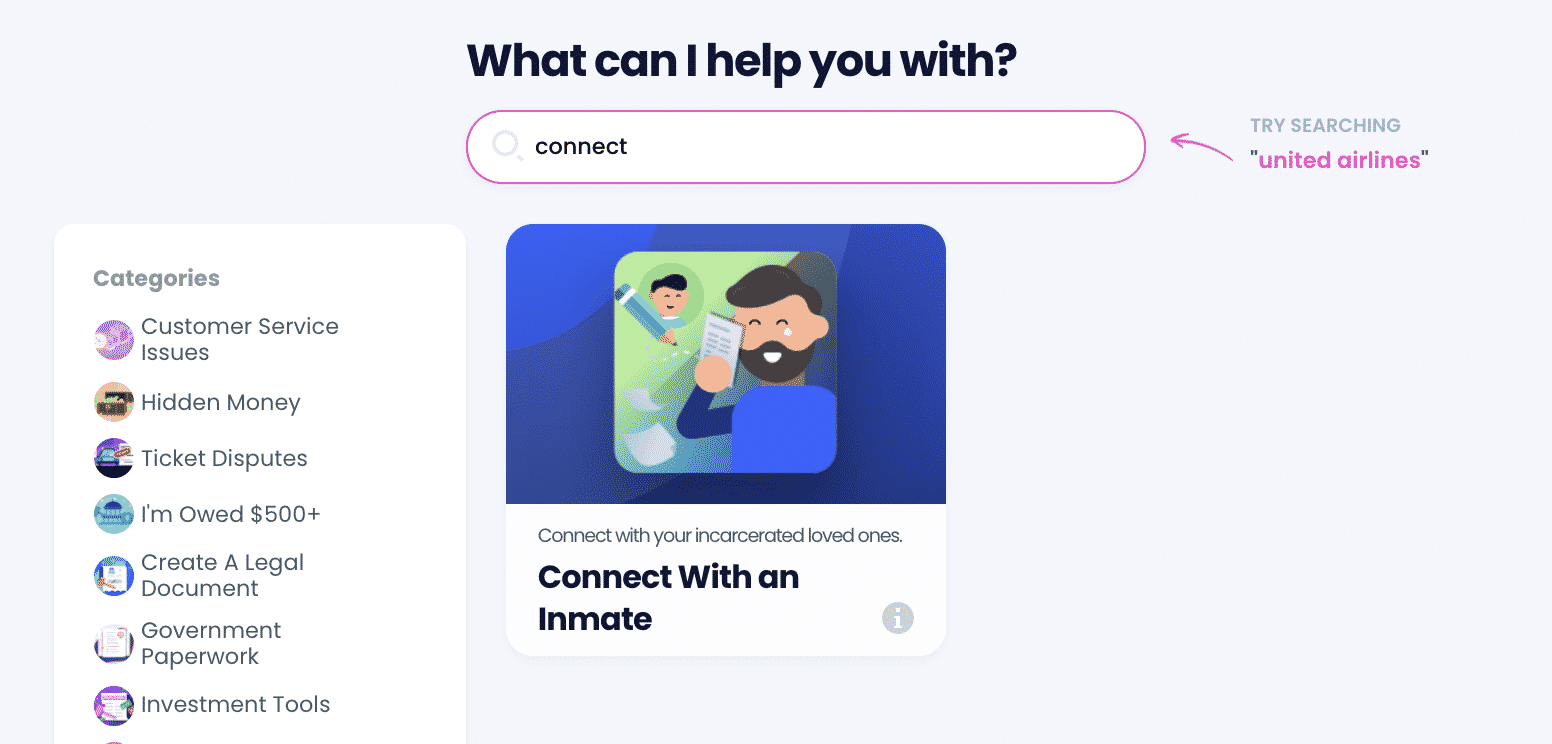
- Choose whether you want to locate a loved one, create a virtual mailbox, or send a personalized letter.
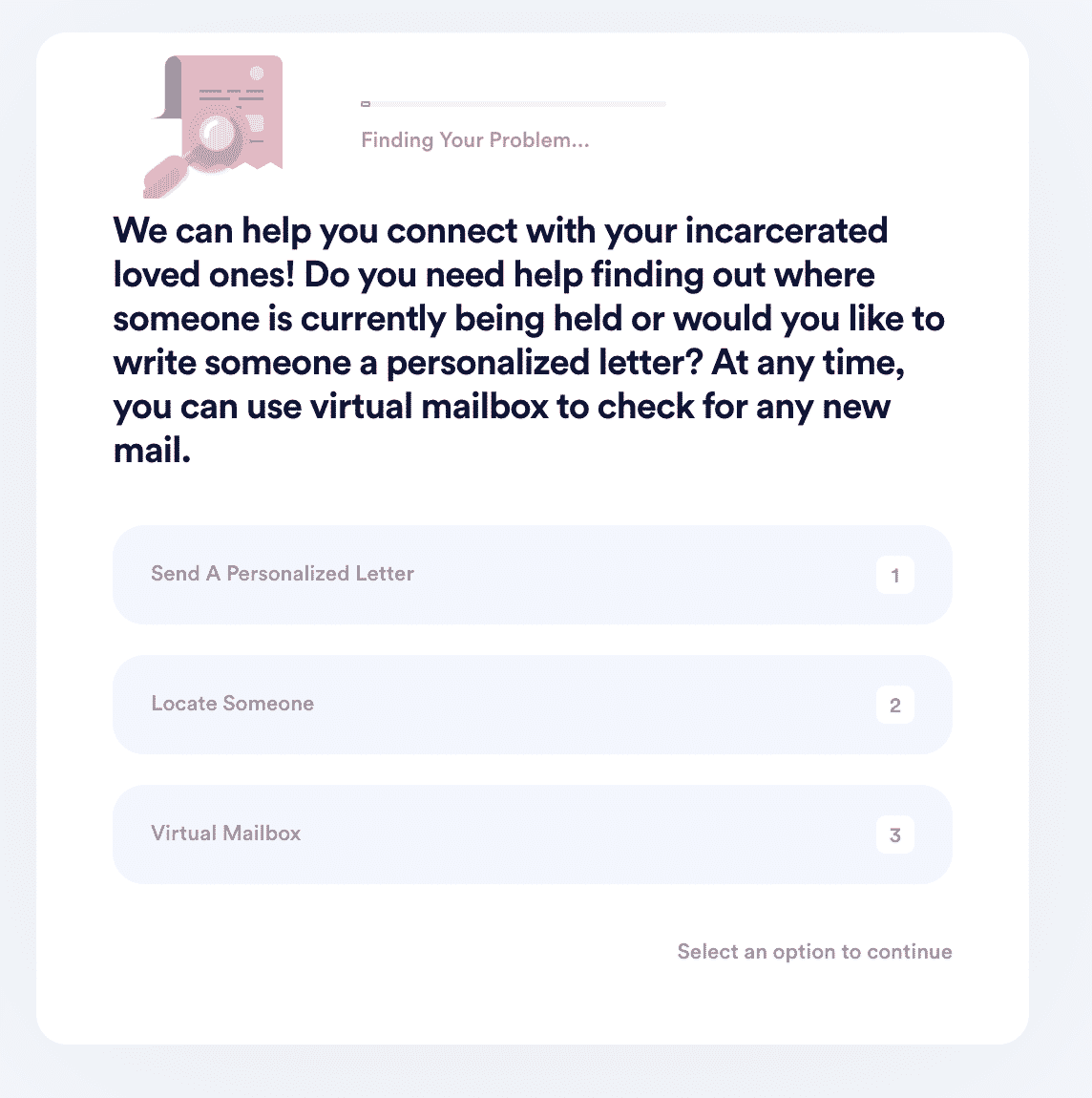
- If you want us to find your loved one, provide his or her personal details and the state they are located in. We'll then conduct a search on the appropriate state database.
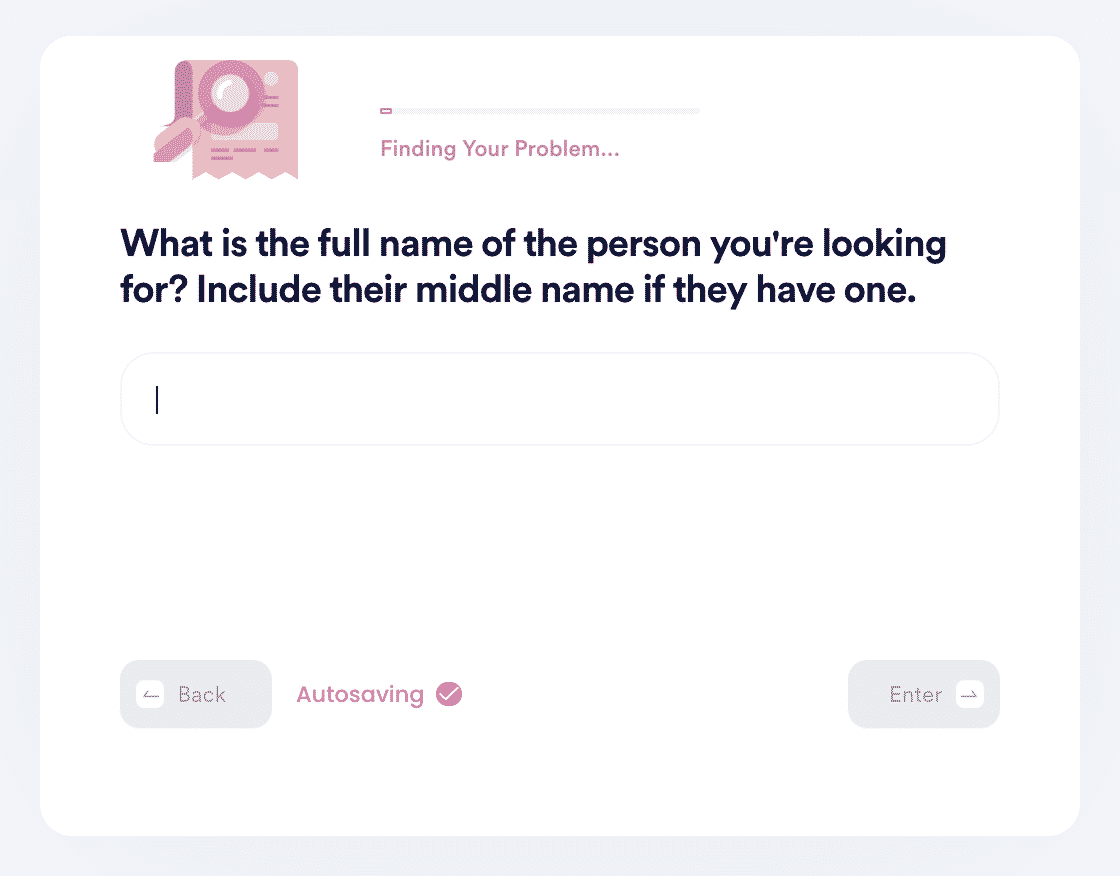
- If you want to create a virtual mailbox, just provide your full name! We'll set one up for you so you can easily receive incoming mail from your loved one.
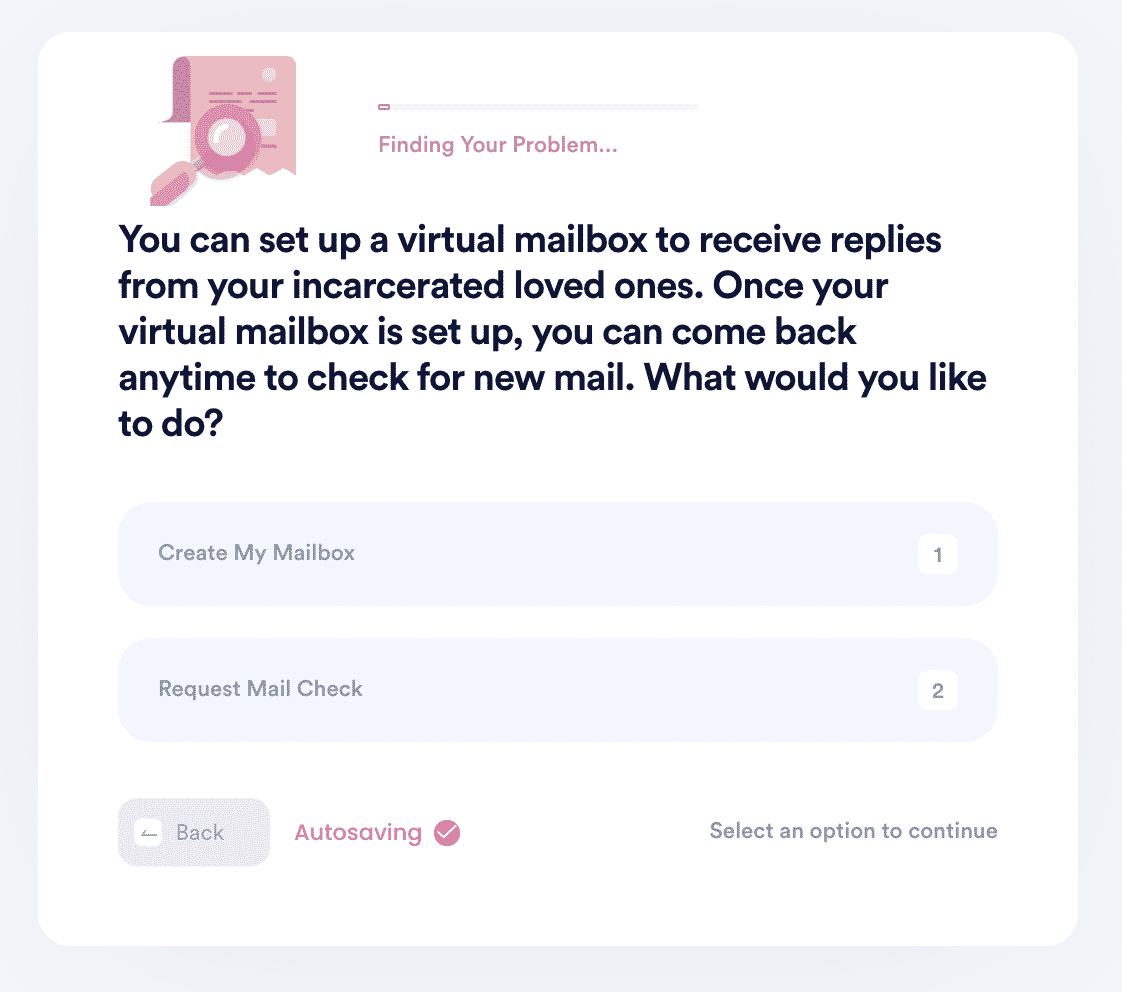
- If sending a personalized letter, tell us which facility your loved one is located in and what you would like to say to them. You can even include a photo! Your letter will be delivered automatically - just wait 10 days for it to arrive to your loved one!
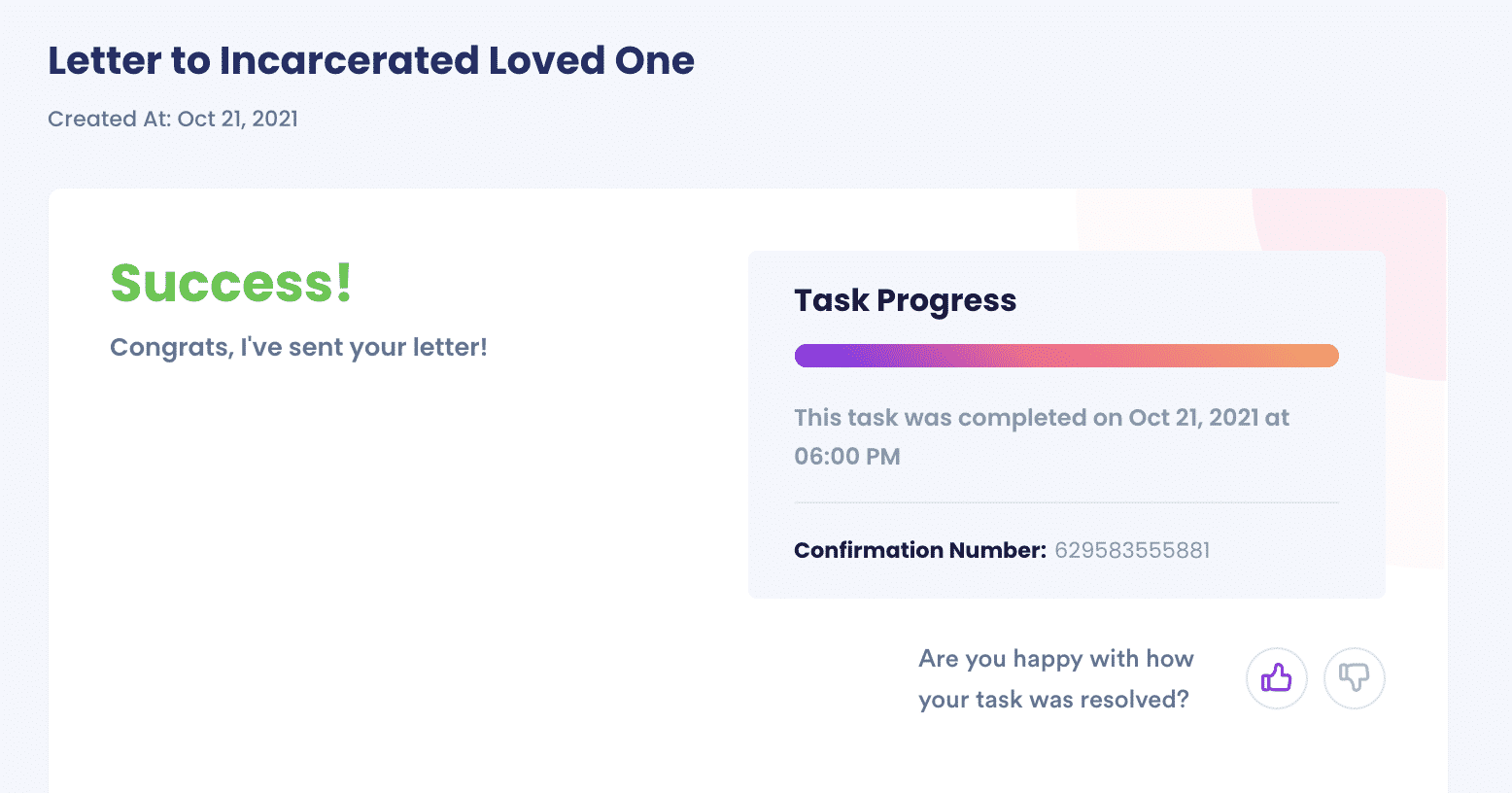
Why Use DoNotPay to Connect With Your Loved Ones
When you use DoNotPay, we will help you with the solutions you are looking for every time. DoNotPay is
- Fast. Quickly get started by clicking on a button. What could be faster than that?
- Easy. Just a few moments of your time giving DoNotPay some information.
- Successful. DoNotPay always gets things done right.
DoNotPay Works Across All Companies
We can also help you learn about other companies in detail. These include organizations such as the following:
- Experian
- Equifax
- Formswift
- LifeLock
- Fastweb
What Else Can DoNotPay Do?
Apart from helping you get in touch with an incarcerated loved one, we can also assist with:
- Suing people and companies in small claims court
- Scheduling a DMV appointment fast and easy
- Getting refunds for delayed or canceled flights
- Contesting parking tickets
- Dealing with bills you are unable to pay
With this guide, we hope we have answered the question: ? Our list of product offerings is almost endless, and there is more in store. Sign up with us to enjoy these and other services.
 By
By